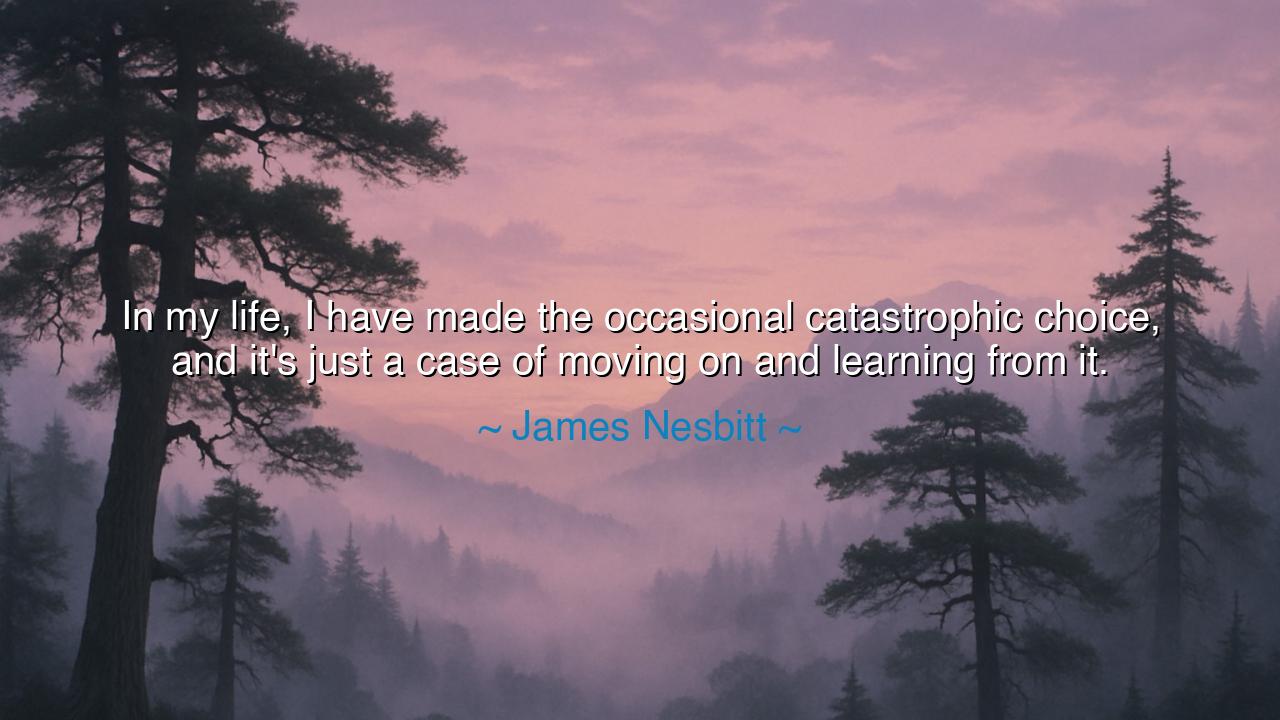
In my life, I have made the occasional catastrophic choice, and
In my life, I have made the occasional catastrophic choice, and it's just a case of moving on and learning from it.






The words of James Nesbitt — “In my life, I have made the occasional catastrophic choice, and it's just a case of moving on and learning from it.” — are an honest confession, carrying the wisdom of one who has stumbled, fallen, and risen again. They remind us of a truth as old as time: no mortal walks without error. To live is to risk, to risk is to err, and to err is to be given the chance to grow. Nesbitt does not deny the weight of his mistakes, but he refuses to let them chain him. Instead, he calls us to the noble path of endurance — to accept failure, to draw wisdom from its ashes, and to continue the journey forward.
When he speaks of a catastrophic choice, he evokes the kind of errors that seem to shatter the ground beneath one’s feet. These are not small stumbles, but great missteps that wound the heart, the mind, or the destiny of a man. And yet, even such calamities do not end the story. They become, instead, the hard teachers of life. For the ancients said: “The fire that burns you teaches you not to touch again.” In this way, mistakes, even grievous ones, become stepping stones when we choose not despair, but learning.
History offers us luminous examples. Consider the tale of Abraham Lincoln, who failed in business, who lost elections, who endured ridicule and despair. By any measure, his path was littered with catastrophic choices and bitter defeats. And yet, because he chose to move on, because he refused to let failure write the final word, he became one of the greatest leaders of his age, guiding his people through the furnace of civil war. His triumph was born not in avoiding mistakes, but in refusing to be defined by them.
The Greeks, too, told of men undone by errors. Odysseus, in his pride, taunted the blinded Cyclops and brought the wrath of Poseidon upon himself. His journey home became long and cursed. Yet from his errors he learned cunning, patience, and endurance. Though his choices brought him suffering, his resilience led him at last to Ithaca’s shores. The lesson echoes Nesbitt’s words: even when choices bring ruin, there remains the path of endurance, of wisdom gained through sorrow.
The teaching here is not that one should seek mistakes, but that when mistakes come — as they always will — we must not dwell endlessly in regret. To move on is not to forget, but to carry the lesson forward without carrying the chains of shame. Regret can paralyze, but reflection can empower. Nesbitt’s words call us to embrace reflection, to claim our scars not as signs of defeat but as marks of experience.
For each of us, the question arises: what will we do with our own catastrophic choices? Will we curse them, hide from them, let them poison the rest of our days? Or will we, like Nesbitt counsels, step forward with humility, saying, “I have learned, and I will keep walking.” The answer to this question shapes the destiny of a life more than the mistake itself ever could.
Practical wisdom follows. When you err, pause and name the mistake honestly. Ask yourself what it teaches, write it down, speak of it to a trusted friend, and then let it go. Do not linger endlessly in self-condemnation, for that is another form of pride. Instead, keep your gaze forward. Begin again, even with small steps. For the ancients knew that the road is long, and the traveler who continues, however scarred, will see horizons the fallen never glimpse.
Thus, Nesbitt’s words become a lantern: choices may wound us, even catastrophically, but they do not end us. To move on, to learn, to endure — this is the path of the wise. Take up your burdens, transform them into teachers, and walk forward. For life is not measured by the mistakes we make, but by the courage with which we rise after them.






AAdministratorAdministrator
Welcome, honored guests. Please leave a comment, we will respond soon